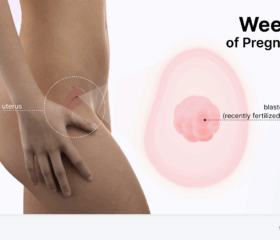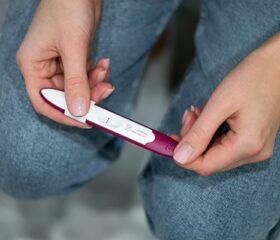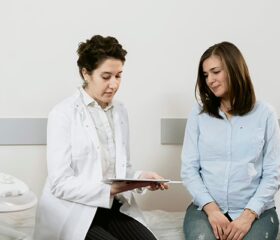What to Know About Coffee and Caffeine During Pregnancy
If you can’t start your day without a hot cup of coffee, the thought of navigating your pregnancy without caffeine might bum you out. Fortunately, you won't have to give it up altogether.

According to experts, 200 milligrams is the maximum amount of caffeine pregnant women should have per day. But how much coffee is that, exactly? And what about other drinks or foods with caffeine in them? 1
Here’s everything you need to know about caffeine and pregnancy, including its effects on you and your baby, how much you can really have, tips for cutting back, and more.
Can you drink coffee after you get pregnant?
Yes, you can have moderate amounts of coffee during pregnancy. Again, experts suggest limiting your daily caffeine intake to around 200 mg, which translates to about one 12-ounce cup of coffee. 2 3 4
Keep in mind that the limitation is on caffeine intake and not on coffee alone. You’ll also need to watch out for caffeine from other sources like tea and soft drinks, as well as:
- Energy drinks
- Energy bars
- Chocolate
- Some kinds of ice cream
- Herbal products and remedies
- Over-the-counter medications
You may sometimes even find caffeine in certain brands of sparkling water. Always read the label to be sure, and keep a log of how much caffeine you’re getting in your journal or in a pregnancy tracker app so you don’t go overboard.
How caffeine can affect you and your baby
Plenty of research has examined the effects that caffeine can have on a pregnant woman’s body, as well as her baby’s. Because of the contradictory evidence these studies have uncovered, there’s no clear-cut proof that caffeine is harmful or harmless.
Most experts recommend erring on the side of caution and capping your daily intake at less than 200 mg.
What symptoms can caffeine cause in pregnant women?
Pregnancy can change how you react to caffeine. You may find that you’re more sensitive to its effects or revolted by the taste of coffee, even if you normally love it. You also might not notice any differences.
It’s worth noting that coffee (and caffeine in general) can give you: 3
- Heartburn
- Insomnia
- More urgent bowel movements
- Jitters
- The need to pee more often
While a lot of these side effects make things extra uncomfortable during pregnancy, they aren’t actually dangerous. Watch out for more concerning symptoms, like increased heart rate and blood pressure. If you have these symptoms, it’s probably best to avoid caffeine entirely.
How caffeine affects iron absorption
There’s also the issue of iron absorption. Consuming large amounts of caffeine can make it difficult for your body to absorb iron. This puts you at greater risk of iron deficiency anemia. 5
While mild anemia is common during pregnancy, if it worsens, you may not get all the nutrients you need for a healthy delivery. Severe anemia can also cause your baby to develop anemia after she’s born, and it increases the risk of: 6
- Preterm delivery
- Low birth weight
- Blood loss during delivery
- Infection during delivery
Again, you don’t have to cut out caffeine altogether, but keep an eye on your iron levels with your doctor. If you want to occasionally indulge in coffee or tea, drink it between meals to lessen the impact on iron absorption. 7
How caffeine can affect your baby
One thing we know for sure about caffeine consumption and pregnancy is that it crosses the placenta. When you have caffeine, it enters both the amniotic fluid and your baby’s bloodstream.
Because your baby’s liver is not fully developed, it can’t efficiently process caffeine and takes longer to do so. Keep your consumption low to moderate to minimize the risks to your baby.
How caffeine affects breastfeeding
You might be eager to get back to drinking your morning coffee or tea after you give birth, but if you want to breastfeed your baby, experts recommend that you still limit your caffeine intake.
Some researchers have found that breastfed babies have a tendency to become fussy or be troubled sleepers when their mom drinks more than two or three cups of coffee a day. The side effects are often stronger in preterm babies and newborns. 3
How much caffeine is actually in the drinks and foods you love?
Luckily for the coffee snobs out there, you don’t have to quit coffee cold turkey. However, you’ll need to start calculating your caffeine intake to stay on the safe side of 200 mg every day.
That means being aware of how much caffeine is in everything you eat and drink, so carefully read the labels on foods and drinks.
You can also use the Caffeine Informer database to look up specific brands, products, and preparations. 8
Below, we’ve listed just a few of the most popular caffeinated drinks to give you an idea of what level of consumption is safe. 2
Amount of caffeine in popular coffee drinks
| Source | Size (oz.) | Caffeine (mg) |
|---|---|---|
| Coffee (brewed) | 8 | 163 |
| Coffee (brewed, decaf) | 8 | 6 |
| Coffee (instant) | 8 | 57 |
| K-Cup coffee | 8 | 100 |
| Latte | 16 | 154 |
| Tea (black) | 8 | 42 |
| Tea (green) | 8 | 18 |
| Tea (iced) | 8 | 47 |
| Coca-Cola Classic | 12 | 34 |
| Diet Coke | 12 | 46 |
| Mountain Dew | 12 | 54 |
| Pepsi | 12 | 38 |
| 5-Hour Energy | 1.93 | 200 |
| Monster Energy | 16 | 160 |
| Red Bull | 8.46 | 80 |
Notably, as you can see, decaf coffee generally still has at least some caffeine, since no decaffeination process is perfect.
Fortunately, the amounts are small, but if you’ve already gotten your 200 mg from other sources, don’t fall into the trap of thinking you can just keep drinking as much decaf as you want.
Dark roast coffee has less caffeine
Dark roast beans expand with air and end up light and puffy, whereas light roast beans tend to be small, dense, and moist. When you measure by whole beans instead of ground coffee, you end up with fewer dark roast beans due to sheer size and volume. As a result, the caffeine content is lower in dark roast beans. 9
How to cut back on caffeine during pregnancy
Cutting back on caffeine is no easy task, especially if it’s a central part of your morning routine. To make it easier, try out the following tips:
Transition slowly
If you quit coffee cold turkey, you may get caffeine withdrawal symptoms, such as: 10
- Headaches
- Fatigue
- Insomnia
- Mood swings
- Difficulty concentrating
While it can be tricky to avoid these withdrawal symptoms, your best bet is to reduce your coffee intake gradually instead of all at once. Instead of pouring yourself three or four cups of coffee a day, go down to two for a while. You can then cut back a little more once your body adjusts.
Switch to decaf
If you love the taste of coffee or just the ritual of drinking something warm (or iced) first thing in the morning, switching to decaf could be the best way to go. Not only do decaf alternatives cut your caffeine intake significantly, but they sometimes offer a placebo effect.
One recent study even found that switching to decaf coffee can lessen the withdrawal symptoms that regular coffee drinkers experience when cutting back. 11
Choose something with a similar taste
If you really enjoy the taste or even the warmth of your morning coffee, try swapping it for something that tastes similar. While you might not feel as perky afterward, these are still good alternatives to satisfy your coffee cravings: 8
- A 6-ounce cup of Choffy (roasted cacao) has 23 mg of caffeine.
- An 8-ounce Crio Bru Brewed Cacao has 10 mg of caffeine.
- A 6-ounce COGO Caffeinated Hot Chocolate has 98 mg of caffeine.
- An 8-ounce mushroom coffee has 50 mg of caffeine.
If you’re struggling to cut back on other kinds of caffeinated drinks, you can find alternatives for them, too. Instead of drinking a Coke or Pepsi, go for another bubbly drink with low or no caffeine, like Sprite, Ginger Ale, or caffeine-free sparkling water.
Drink tea instead of coffee
Like the other alternatives mentioned above, switching to tea will let you keep your morning ritual intact without overdoing it. Pound-for-pound, many teas contain significantly less caffeine than coffee.
Before picking up tea at the store, check how much caffeine it has. The size of the leaves, where they’re grown, and the way the tea is processed all affect the caffeine content. 12
You can also try out herbal teas, especially as some can offer relief from uncomfortable pregnancy symptoms. Ginger tea, for example, is a common home remedy for morning sickness (nausea and vomiting). Other good caffeine-free options to check out are: 13
- Peppermint tea
- Rooibos tea (this has calcium and antioxidants)
- Lemon balm (good for calming mild irritability, anxiety, and insomnia)
Whichever teas you choose to try, always get them from reputable retailers to ensure they meet the highest quality and purity standards.
Cautionary note about red raspberry leaf tea
Drinking red raspberry leaf tea during pregnancy has long been touted as something of a miracle cure for many pregnancy complications like preterm labor, preeclampsia, and postpartum hemorrhage. Many people also claim that it can reduce the length of labor.
However, it isn’t classified as a medication (just a beverage or herbal supplement), which means it hasn’t been evaluated by the FDA for safety. There also isn’t much research to back up its purported health benefits or determine whether there are any long-term risks from drinking it while you’re pregnant. 14
As red raspberry leaf tea can sometimes stimulate cramping or contractions, it’s safest to avoid it unless you’re 39 weeks pregnant or more. 14
Which teas should you avoid while pregnant?
As for which ones you should avoid, stay away from cohosh and pennyroyal teas, which have been linked to miscarriage. 15 You should also avoid chamomile, which, like red raspberry leaf tea, can cause contractions (which, in turn, can lead to fetal distress).
If you’re ever in doubt about what’s safe to consume while pregnant, speak with your doctor.
Get your energy from other sources
If you’re worried about how you’re going to keep your energy up, there are other things you can try.
You can start by drinking around 8 to 12 cups (64–96 ounces) of water a day, which will combat fatigue and headaches. 16 You should also keep your pregnancy diet in check, adding plenty of nutritious foods. It’s a good idea to eat smaller, frequent meals or healthy pregnancy snacks to stabilize your energy.
Make sure you’re also getting enough sleep (around 8 hours each night) so you’re well-rested throughout the day. Regular mild to moderate exercises, like walking and swimming, are some of the best pregnancy workouts to give you a natural energy boost.
Moreover, continue taking your prenatal vitamins to ensure you’re getting daily nutrients, which help with energy. 17 18
If you’re still unsure about which activities are safe, what kinds of vitamins to take or food to eat, or anything else, bring them to your doctor.
Final thoughts
Whether you give up coffee and your other favorite caffeinated treats altogether or just cut back on them, this won’t last forever.
While you’ll need to be mindful of how much caffeine you have during pregnancy and while you’re breastfeeding, you’ll be free to reignite that love affair with your daily cups of joe eventually.
Article Sources
- American College of Obstetricians and Gynecologists. "How much coffee can I drink while I'm pregnant?" Retrieved August 28, 2025.
- Nemours KidsHealth. "Coffee and Caffeine Use During Pregnancy" Retrieved August 28, 2025.
- March of Dimes. "Caffeine in pregnancy" Retrieved August 28, 2025.
- National Institute of Diabetes and Digestive and Kidney Diseases. "Health Tips for Pregnant Women" Retrieved August 28, 2025.
- Korean Journal of Family Medicine. "Association between Coffee and Green Tea Consumption and Iron Deficiency Anemia in Korea" Retrieved August 28, 2025.
- American Society of Hematology. "Anemia and Pregnancy" Retrieved August 28, 2025.
- Healthline. "Do Coffee and Caffeine Inhibit Iron Absorption?" Retrieved August 28, 2025.
- Caffeine Informer. "Caffeine Content of Drinks" Retrieved August 28, 2025.
- Healthline. "Light vs. Dark Roast Coffee: What’s the Difference?" Retrieved August 28, 2025.
- Healthline. "Caffeine Withdrawal Headache: Why It Happens and What You Can Do" Retrieved August 28, 2025.
- Daily Coffee News. "Research: Decaf May Open Doors for Placebos in Other Drug Treatments" Retrieved August 28, 2025.
- Serious Eats. "5 Tea Myths That Need to Disappear" Retrieved August 28, 2025.
- American Pregnancy Association. "Herbal Tea & Pregnancy" Retrieved August 28, 2025.
- Lamaze International. "So You Want to Know About... Red Raspberry Leaf Tea" Retrieved August 28, 2025.
- The American Journal of Emergency Medicine. "Toxicities of herbal abortifacients" Retrieved August 28, 2025.
- American College of Obstetricians and Gynecologists. "How much water should I drink during pregnancy?" Retrieved August 28, 2025.
- American College of Obstetricians and Gynecologists. "Nutrition During Pregnancy" Retrieved August 28, 2025.
- March of Dimes. "Vitamins and other nutrients during pregnancy" Retrieved August 28, 2025.







